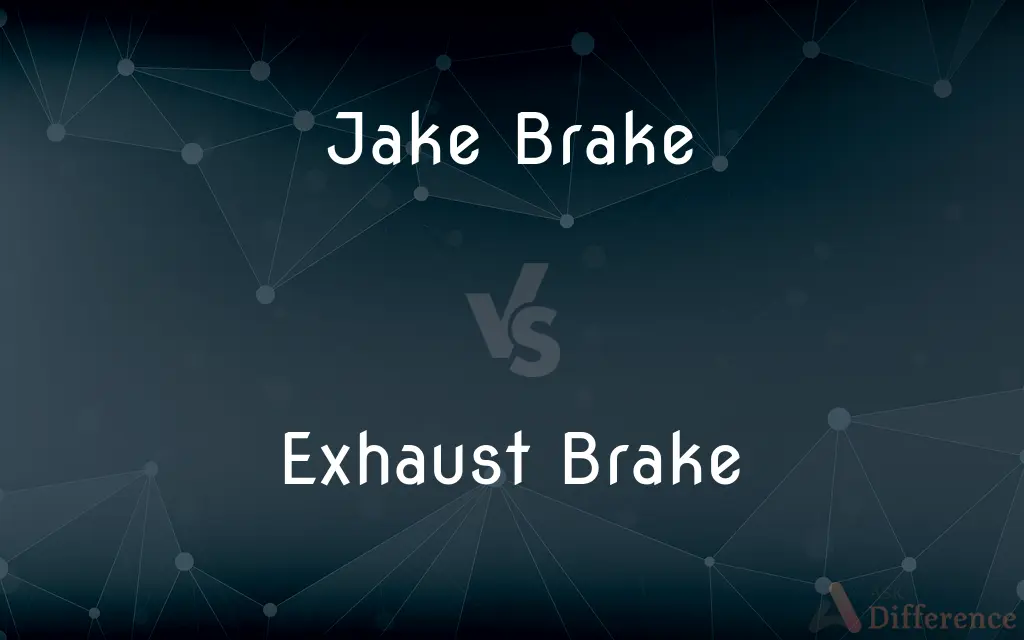Jake Brake vs. Exhaust Brake — What's the Difference?
By Maham Liaqat & Urooj Arif — Published on March 7, 2024
Jake Brake (engine compression release brake) reduces vehicle speed by opening exhaust valves, while an exhaust brake restricts exhaust flow, increasing backpressure.

Difference Between Jake Brake and Exhaust Brake
Table of Contents
ADVERTISEMENT
Key Differences
A Jake Brake, technically known as an engine compression release brake, works by opening the exhaust valves at the top of the compression stroke, causing the compressed air in the cylinder to be released directly into the exhaust system, thus slowing down the vehicle. This method is particularly effective for large diesel engines. In contrast, an exhaust brake increases backpressure in the exhaust system, which in turn puts resistance against the pistons moving upward, slowing down the engine and vehicle.
The Jake Brake is often used in heavy-duty diesel engines found in trucks and buses, providing a way to slow down the vehicle without relying solely on traditional friction brakes. This can help in extending the life of the brake pads and the overall braking system. On the other hand, exhaust brakes are more universally applicable, including in smaller diesel engines, where modifying the valve mechanism for a Jake Brake would be impractical or too costly.
The operation of a Jake Brake results in a distinctive, loud rumbling or rattling noise, which can be disruptive in residential areas, leading to its use being restricted or banned in certain locations. Exhaust brakes, however, operate more quietly, making them less disruptive and more acceptable for use in a wider range of environments.
From a driver's perspective, using a Jake Brake requires a specific setup within the engine's valve train, which can be more complex and expensive to maintain. Exhaust brakes, being simpler in design and operation, can be a more cost-effective solution for vehicles not already equipped with a Jake Brake system.
Both systems have their advantages in terms of vehicle control and safety, especially on steep grades where maintaining a safe speed is crucial. However, the choice between a Jake Brake and an exhaust brake often comes down to the specific needs of the vehicle, the type of engine, and the operating environment.
ADVERTISEMENT
Comparison Chart
Mechanism
Opens exhaust valves to release compression
Increases backpressure in the exhaust system
Common Usage
Heavy-duty diesel engines (trucks, buses)
Wide range of diesel engines
Noise Level
High, distinctive rumble
Lower, less disruptive
Installation Complexity
High, involves engine valve train
Lower, simpler modification to the exhaust system
Cost
Higher due to complexity and maintenance
Generally lower
Compare with Definitions
Jake Brake
Known for its distinctive loud noise during operation.
The noise from the Jake Brake prompted noise ordinances in residential areas.
Exhaust Brake
Suitable for a wide range of diesel engines, including smaller vehicles.
The van's exhaust brake improves safety on long descents.
Jake Brake
An engine braking mechanism that reduces the need for traditional friction brakes.
Using the Jake Brake, the driver maintained control without wearing out the brake pads.
Exhaust Brake
Operates more quietly than a Jake Brake, making it less disruptive.
The driver used the exhaust brake, maintaining silence through the neighborhood.
Jake Brake
A braking system used in diesel engines to slow down the vehicle by releasing compressed air from the cylinders.
The trucker engaged the Jake Brake descending the steep hill to avoid overheating the regular brakes.
Exhaust Brake
A device that creates backpressure in the exhaust system to slow down a vehicle.
The exhaust brake was activated to manage speed without additional brake wear.
Jake Brake
Requires specific engine setup, making it more complex.
The new model comes equipped with a Jake Brake, offering enhanced downhill control.
Exhaust Brake
Enhances vehicle control and safety, especially on declines.
The exhaust brake proved essential for controlling the truck's speed downhill.
Jake Brake
Primarily found in heavy-duty vehicles for additional braking power.
The bus utilized its Jake Brake to navigate the mountainous terrain safely.
Exhaust Brake
Easier and cheaper to install and maintain compared to Jake Brakes.
The fleet was updated with exhaust brakes due to their cost efficiency.
Common Curiosities
Why are Jake Brakes louder than exhaust brakes?
Jake Brakes release compressed air directly into the exhaust, creating a loud noise, whereas exhaust brakes restrict exhaust flow more quietly.
What's the main difference between a Jake Brake and an exhaust brake?
A Jake Brake releases compression in the cylinders, while an exhaust brake increases backpressure in the exhaust system.
Are Jake Brakes illegal in some areas?
Yes, due to their noise, the use of Jake Brakes is restricted or banned in certain residential areas.
Can an exhaust brake be used in any driving condition?
Yes, exhaust brakes are versatile and can be used in various driving conditions, including urban areas.
Is it expensive to install a Jake Brake?
Installation can be costly due to the complexity of modifying the engine's valve train.
Is one system better for fuel efficiency?
Neither system significantly affects fuel efficiency; their main purpose is to provide braking power.
Can both Jake Brake and exhaust brake be used on any diesel engine?
Jake Brakes are typically used in large diesel engines, while exhaust brakes can be used in a broader range of diesel engines.
Can using a Jake Brake or exhaust brake reduce wear on traditional brakes?
Yes, both systems reduce reliance on friction brakes, potentially extending their lifespan.
Which is more effective for slowing down a heavy-duty truck?
Jake Brakes are often preferred for heavy-duty trucks due to their powerful braking capability.
Do both braking systems require special maintenance?
Yes, both systems require maintenance, but Jake Brakes may require more due to their complexity.
Do these braking systems work on petrol engines?
No, they are designed specifically for diesel engines due to their operational mechanics.
Can using these brakes improve overall vehicle safety?
Yes, by providing additional braking power, especially on declines, they enhance vehicle control and safety.
Do exhaust brakes require engine modification?
No, they typically involve simpler modifications to the exhaust system.
How do drivers control these braking systems?
Both systems are typically controlled via switches or levers in the vehicle's cab.
Can I retrofit my vehicle with a Jake Brake or exhaust brake?
Retrofitting with an exhaust brake is generally easier, while adding a Jake Brake may not be feasible for all engine types.
Share Your Discovery

Previous Comparison
Identifier vs. Keyword
Next Comparison
Moisture Content vs. Water ContentAuthor Spotlight
Written by
Maham LiaqatCo-written by
Urooj ArifUrooj is a skilled content writer at Ask Difference, known for her exceptional ability to simplify complex topics into engaging and informative content. With a passion for research and a flair for clear, concise writing, she consistently delivers articles that resonate with our diverse audience.
















































